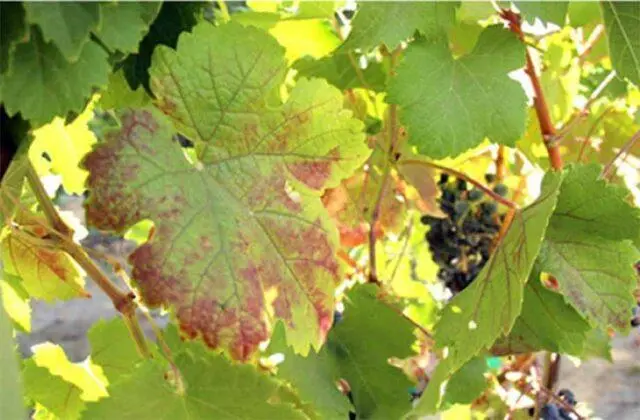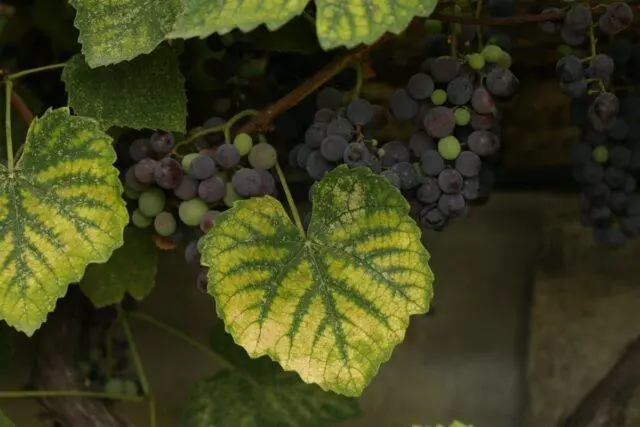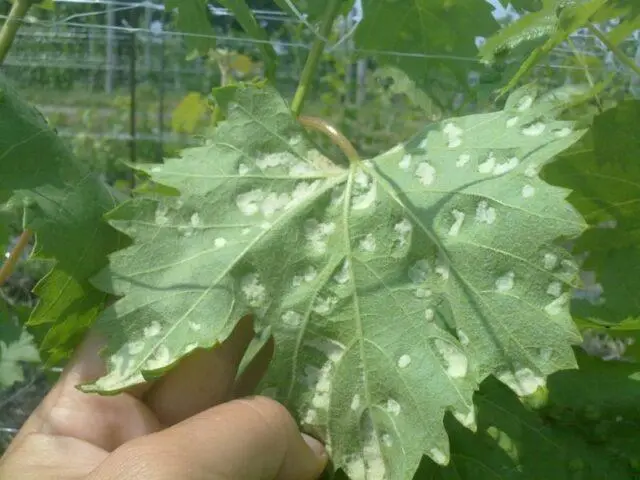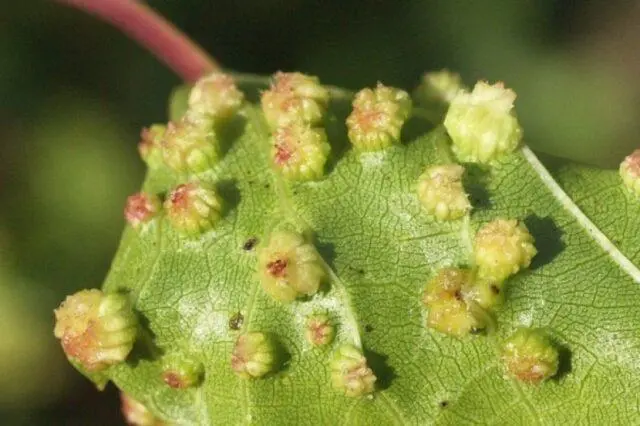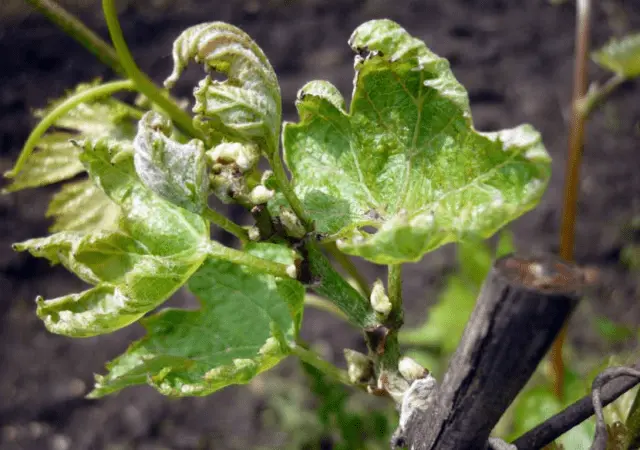Contents
Brown spots on grape leaves can be associated not only with diseases, but also with improper care. Even if the cultivation technique is correct, the weather can fail. Grapes are heat-loving crops and can suffer from cold, late spring and rainy summers.
Why are there dark spots on vine leaves?
If the foliage, shoots, and other parts of the grapes are covered with brown spots, this may be due to various reasons. They can be divided into several groups:
- lack or excess of individual trace elements;
- excessive watering;
- fungal diseases;
- bacterial pathologies;
- viral infections;
- an objective factor is temperature fluctuations, cold spring, rainy summer.
Determining the cause is not always easy. Brown spots can appear immediately due to several factors. Therefore, for prevention, it is necessary to immediately adjust the watering and introduce complex top dressing.
Non-infectious causes
The appearance of rusty spots on grape leaves does not always indicate infectious diseases. Often the problem is due to improper care, damage or weather conditions.
weather or damage
Brown spots on the leaves and vine of grapes may appear due to adverse weather. Almost all varieties of grapes are demanding for warmth, an abundance of light. They do not tolerate temperature extremes, cool and rainy summers. Therefore, varieties must be selected in accordance with the climatic characteristics of the region. If the weather often deteriorates, it is better to grow bushes in a greenhouse.
Also, brown spots on leaves and shoots appear due to mechanical damage, for example, due to strong winds. Therefore, when growing, it is recommended to put props, which is especially important for young seedlings.
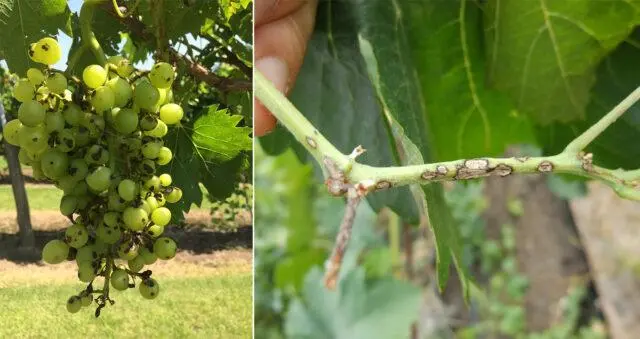
Brown spots often affect not only leaves, but also shoots of grapes.
In the presence of diseases, the bushes will be clearly underdeveloped. Outwardly, this is manifested by such signs:
- short shoots;
- asymmetric shape – growth is more pronounced in one direction than in the other;
- the stains will spread more actively and begin to rot quickly.
Improper care
Improper care can lead to brown spots on the vine leaves that look like rust. This is due to such factors:
- excessive or insufficient watering;
- frequent application of fertilizers or their lack;
- lack of sunlight due to the wrong landing site (shade).
The foliage begins to fade or turn pale, eventually loses its elasticity, becomes covered with dots.
Micronutrient deficiency
Brown and brown spots on grape leaves can also appear as a result of a lack of certain trace elements:
- With potassium deficiency, the leaves first turn yellow. After that, a brown color appears along the contour of the leaves. Moreover, the affected areas become very fragile. When the lack of potassium becomes too great, very dark, almost black dots will appear on the foliage. After that, instead of them there will be holes.
- If there is little calcium, the foliage becomes lighter. And over time, rusty or brown spots appear on the leaves of the grapes. Gradually, they begin to curl up and fade, and then fall off.
- Iron deficiency results in yellow areas that darken and turn brownish over time.
Fungal lesions
Dark spots on grape leaves, vines and fruits are very often associated with fungal diseases. This is a particularly dangerous situation as the disease spreads rapidly and the spores are airborne to other plants. Therefore, it is desirable to recognize the infection and treat it as early as possible.
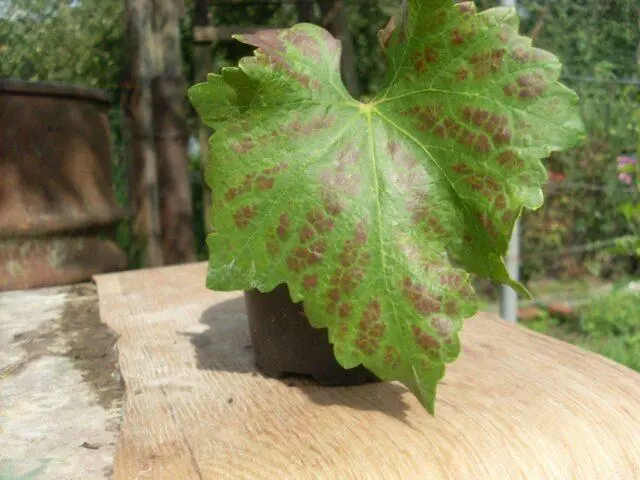
The massive appearance of brown spots indicates the development of fungal infections.
Mildew
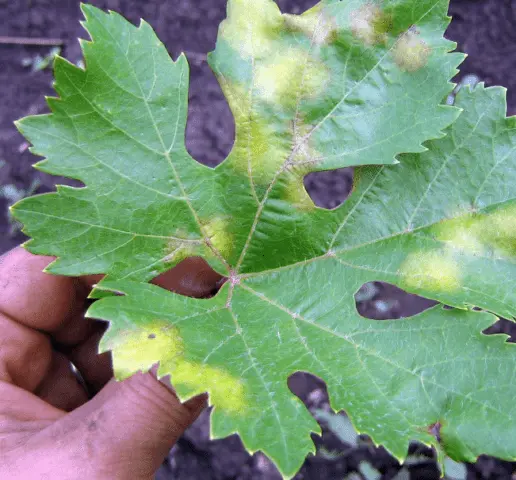
Mildew is a common pathology, which is also called downy mildew.
It is quite simple to detect it – the disease manifests itself with such symptoms:
- brown, with a red or yellowish tinge of the area on the upper side of the leaf plate;
- drying, darkening and death of foliage;
- thick white coating on inflorescences and berries;
- dark spots not only on the leaves, but also on the vine, and the shoots gradually dry out and die.
Antraknoz
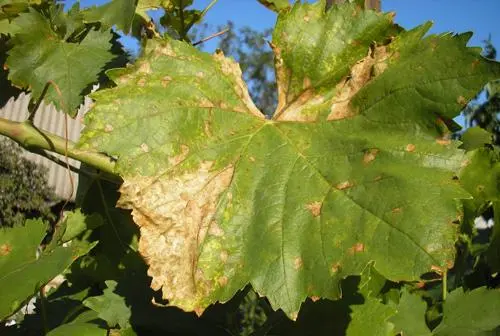
Anthracnose affects all above-ground organs of the plant
In Our Country, this disease is not common – it is mainly common in countries with a warm climate, including Central Asia, Ukraine, Moldova, Transcaucasia. Main features:
- brown, brown spots with a whitish border are formed on the leaves. Over time, they begin to merge;
- damaged tissues die and fall out;
- sunken dots of brown color are formed on the shoots;
- branches become dry and break;
- dark spots eventually form on grapes.
Oidium
This infectious fungal disease is also called powdery mildew. The main symptoms of damage are:
- grayish-white dust on foliage;
- leaf plates lag behind in development and become curly;
- inflorescences and clusters seem to be sprinkled with flour or ash;
- the berries begin to dry out, peas are observed;
- Gradually, mold starts on the fruits, which only accelerates their death.
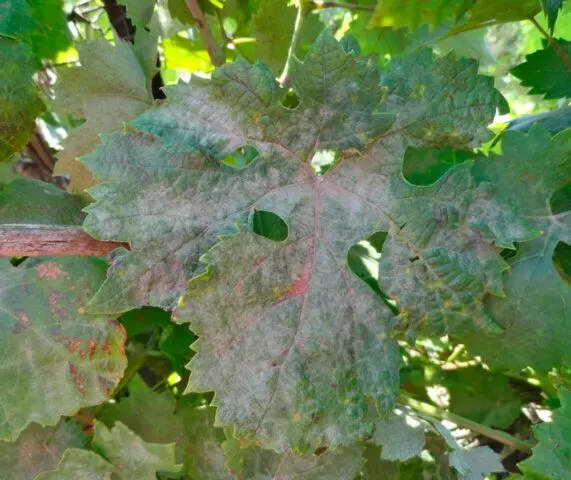
Mildew affects not only foliage, but also berries
Black spot (escoriosis)
This infection develops on different parts of the grape. Visually, pathology can be determined by the following signs:
- the bark becomes discolored;
- on the affected areas, fruiting bodies of fungi are formed;
- dots increase and merge, become longitudinal brown spots;
- necrotic areas of dark, almost black shades appear on the foliage, which gave the name to the disease.
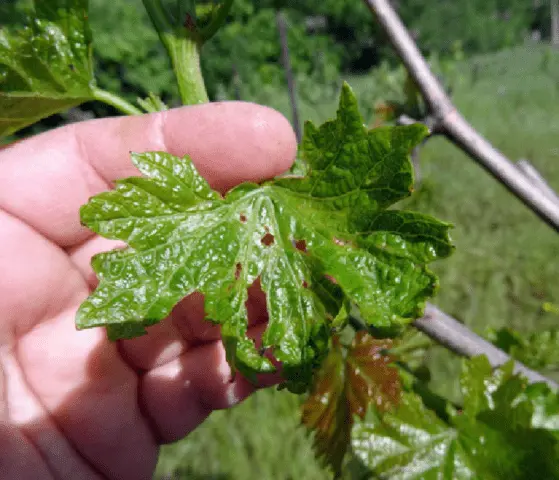
A leaf plate of grapes affected by black spot is easy to notice during visual inspection.
Cerkosporoz
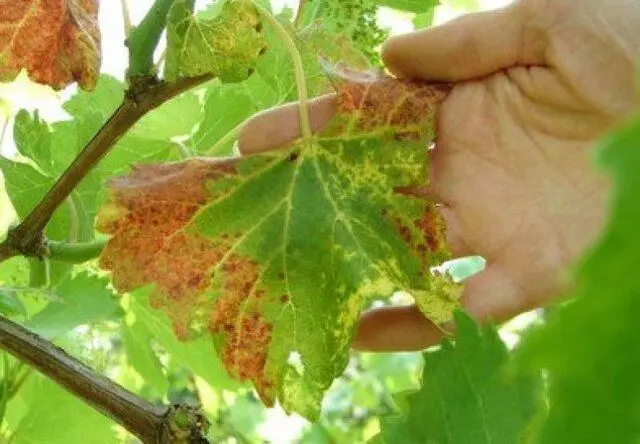
Cercosporosis can be detected at an early stage
With a disease on the back of the grape leaves, spots of olive shades are formed. Over time, they darken and turn brown, while their outline is light.
Fuzarioz
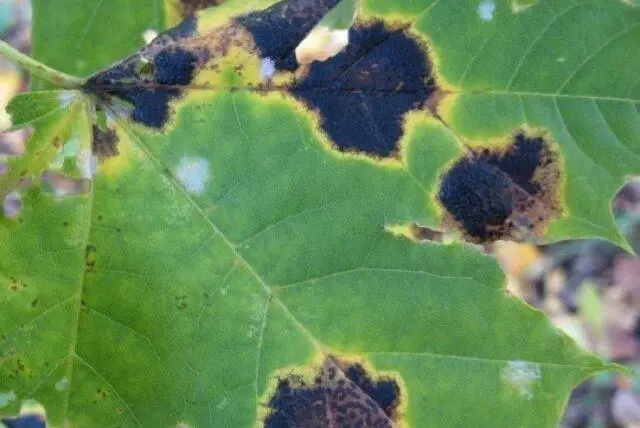
Fusarium is accompanied by a sharp yellowing of almost all grape leaves.
Yellowish spots are visible on shoots and berries. Then they turn brown, after which the foliage dries out and dies.
Alternaria
Another dangerous fungal disease that leads to brown spots on the foliage, less often with a silvery tint.
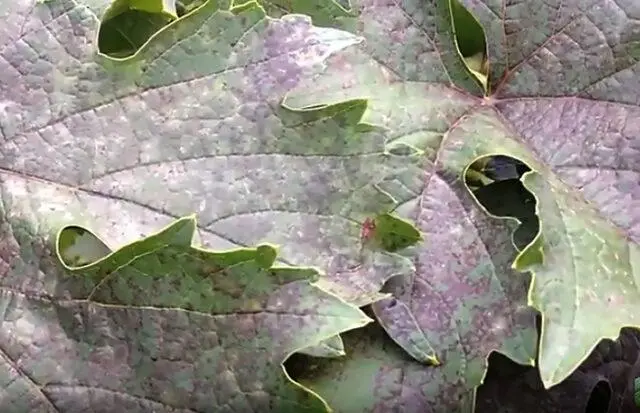
The peculiarity of Alternariosis is a very rapid spread
Planting grapes should be periodically inspected so that, if necessary, immediately carry out processing.
Bacterial infections
The appearance of rusty spots on the leaves can also be associated with bacterial diseases. They also have an infectious nature, so there is a risk of infection of several plants.
Bacterial cancer
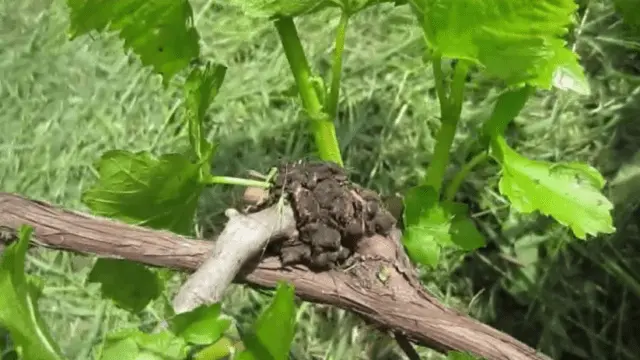
Cancer affects different parts of the vine, often in the lower region, close to the soil surface, less often the roots.
Visually, the disease is a white or brown fleshy tumor. Cancer is clearly visible only in the middle of the season, in July-August. As the tumor develops, it rapidly increases in size, its diameter reaches several centimeters, sometimes 10-15 cm.
Bacteriosis
Bacteriosis (also Pierce’s disease) affects the entire plant or only certain parts. It is associated with pathogenic bacteria that are spread by insect vectors. The main symptoms are irregularly shaped spots of a greenish and brown hue. They mostly appear on shoots.
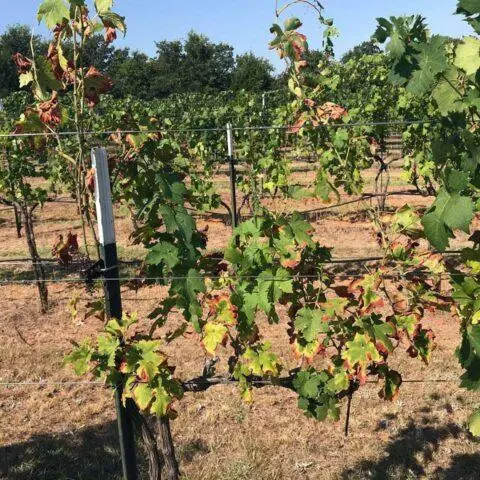
With bacteriosis, plants lag behind in growth, wither and die.
Bacterial necrosis
This disease is also called bacterial wilt or Oleiron’s disease. It affects all organs of grapes – brown spots appear on leaves, shoots and berries. Black ulcers form on perennial branches, they are deeply pressed, due to which the surface becomes embossed. Shoots become brittle, quickly break and die.
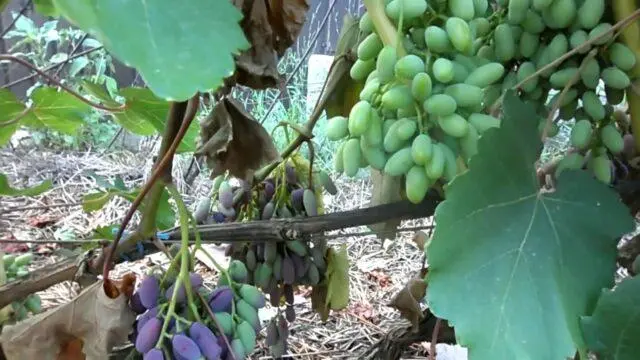
Brown dots may be a sign of bacterial necrosis
Viral infections
The appearance of rusty, brown spots on vine leaves is sometimes associated with viral diseases. The most common infections are:
- The red spot virus causes damage to the foliage. Areas of a brownish-red tint appear on the surface, over time they can become brownish. The leaves curl up and die.

- Necrosis of the veins leads to inhibition of growth and the appearance of a dark brown bark, often with black dots and cracks along the shoot.

vermin
Insects are another group of reasons due to which brown spots appear on the leaves and shoots of grapes. Pests dangerous to grapes:
- The most common are ticks. The main symptom is the tubercles on the leaf plate, covered with a thin cobweb. The tick is dangerous not only in itself, but also because it carries fungal infections that can lead to loss of yield and even death of the bush.

- Grape aphid (phylloxera) – its invasion can be recognized by the appearance of galls on the foliage, and they are not immediately noticeable, but only in the second year. Damage zones become covered with brown bumps and swellings over time. At the same time, the pest itself is not noticeable, since the aphid spends most of its time in the root zone of the bush.

- Thrips lead to the formation of brown spots on the leaves of the vine, due to which they lose their shape and gradually curl. This is bad for all parts of the plant.

What to do if the grape leaves are covered with brown spots
First of all, it is necessary to diagnose the cause. If this fails, you need to adjust the watering and feed the plant with organic matter or a complex mineral composition. Feeding should contain various trace elements, including calcium and iron.
If these measures helped, then the grapes were not affected by the infection. But if the care is normal, and the weather is good enough, and the brown spots do not go away, the cause is probably related to diseases. In this case, it is necessary to carry out 1-2 treatments with special preparations:
- “Horus”;
- “Strobe”;
- “Topaz”;
- “Thanos”;
- “Thiovit”;
- “Fitoverm”;
- “Arcedrid”;
- “RAW”.
They are effective in the fight against fungi. In the case of bacterial and viral damage, it is not always possible to achieve a result. If the bush is badly damaged, covered with brown spots, it is better to plant it in a quarantine zone or burn it right away.
Insecticides are used to control pests:
- “Karate”;
- “Talstar”;
- “Aktellik”;
- “Inta-Vir”;
- Kinmiks and others.
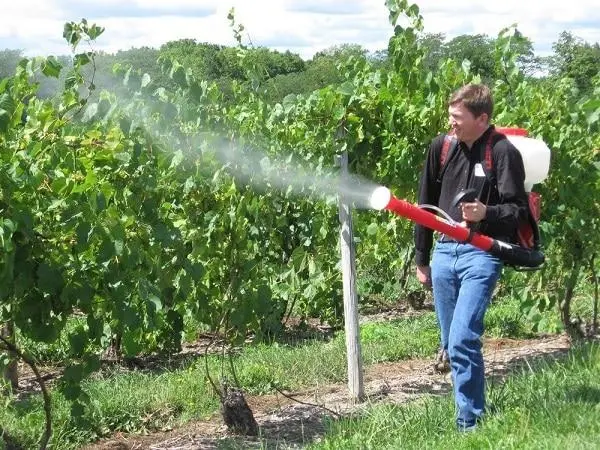
For prevention, processing of grapes should be carried out every spring.
Preventive measures
As a preventive measure, it is recommended to follow the basic care measures:
- do not abuse watering – give water every 1-2 weeks (the surface layer of the soil should have time to dry out);
- regularly fertilize at least twice a season;
- carry out preventive treatments in the middle of spring;
- when growing in a greenhouse, periodically ventilate it;
- when planning plantings, do not make them too dense – there should be a passage of at least 80-100 cm between the crowns.
Conclusion
Brown spots on grape leaves are not the norm – their appearance always indicates improper care, bad weather, or the development of diseases. Therefore, it is recommended to regularly inspect the plantings and, if necessary, immediately take action: feed the plant, treat it with drugs. During the fruiting period, it is better to use folk remedies.










